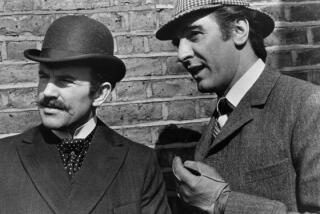Happy Birthday, Dear William : Is it nobler in the mind to suffer the slings and arrows of outrageous fortune, or to take arms against a sea of troubles?
- Share via
What’s this I hear about Shakespeare being scratched from the latest edition of “The 100: A Ranking of the Most Influential Persons in History”? He has been replaced by Edward de Vere, 17th Earl of Oxford, as the True Author.
My first reaction is simply to ignore the matter. After all, anyone is a noodle who thinks de Vere wrote the plays traditionally ascribed to Shakespeare. And anyone who comes up with a title like “The 100” has no right to make literary pronouncements.
What is not so easy to dismiss is that people may think that the authorship is in doubt. It’s not. Maybe the time has come for Stratfordians (those who know that William Shakespeare from Stratford-on-Avon wrote the plays) to stand up to the anti-Stratfordians (those who think otherwise).
For years, I did not speak out, even when a typical cocktail conversation went something like this:
Stranger: So you’re a professor of literature?
Me (to myself): Oh, no, I can see it coming.
Stranger: Who do you think really wrote Shakespeare’s plays?
Me (aloud): Well, I . . .
Stranger: Don’t you think they had to be written by (any of 50-odd candidates--including Sir Francis Bacon, Sir Walter Raleigh, the Earl of Oxford, the Earl of Derby, the Earl of Rutland, Earl Scheib, Queen Elizabeth, Mary Queen of Scots)?
Me (to myself): Stuff and nonsense!
Me (aloud): Sure, you’re absolutely right.
OK, I admit I took the easy way out. I went to parties to meet amusing people, not to squabble over Shakespeare. But now that the anti-Stratfordians are starting to pollute popular reference works, it’s time to shake the spear in Will’s defense.
Generally, I would not presume to speak on behalf of any group. But I think I’m safe in saying that on the authorship issue, I speak for 99.9% of literature professors who specialize in Shakespeare and his age. (This is a strong claim, since we disagree on just about everything else.) We believe in the Bard. Not as a matter of faith, but as a matter of fact.
Many wonder why professors of English are not busily trying to answer the question of who wrote Shakespeare. We are not because there is not a shred of hard evidence against Shakespeare’s authorship. All we have been given by amateur investigators and pseudoscholars is a mishmash of conspiracy theories, tissue-thin arguments, inconsistencies, distortions, contradictions and supposed parallels between scenes in the plays and the lives of various earls and sirs. Academics aren’t studying the authorship question for the same reason that respected astrophysicists aren’t chasing flying saucers. When serious scholars have turned to the issue, the anti-Stratfordians have been dealt many a deathblow. But, like Falstaff at the Battle of Shrewsbury, they pop back up again.
We are also fed up with being told that better minds than ours have doubts about Shakespeare’s authorship. In a recent article in The Times, Charles Champlin drags out the tired observation that “Mark Twain, Henry James and Sigmund Freud (among other worthies) found it impossible to believe that the historical Shakespeare . . . was capable of the playwright’s glorious language.” Two may be outstanding novelists and the other the father of psychoanalysis, but not one of these “worthies” knew spit about the Elizabethan era.
The real question is why so many uninformed folk instinctively feel that Shakespeare could not have written the plays. The answer lies not in historical facts, but in cultural attitudes. Let me address just two of these--snobbery and Byronism. Almost all the candidates proposed by the anti-Stratfordians are of aristocratic birth. This bias is based on the ridiculous presumption that only the nobility were educated and traveled enough to create the plays. That not one of these earls could write his way out of a paper bag does not stop the theorists. Actually, Shakespeare had precisely the social background one would expect of a popular playwright. Many of the other giants of English literature--Chaucer, Spenser, Donne, Milton--had similar middle-class origins.
It is important to note that no one in Shakespeare’s own day or for nearly 200 years seriously questioned the authorship of his plays. It wasn’t until the 19th Century that the doubting began; an unintentional contributor may have been Lord Byron, the second most famous person of the early 1800s (Napoleon was No. 1), who put into people’s heads the notion that one had to live an outrageously dramatic life to write dramatic poetry. Byron “proved” that much-traveled lords make the best writers.
Although Shakespeare was a mere commoner, he was a genius of the theater. April 23 marks the date of his birth. To celebrate, why not reread one of his masterpieces--not reducing it to an allegory of authorship--but for pleasure, reveling in the language.
Here’s to your 429th birthday, William Shakespeare. All the dissenting breaths in the world can never blow out your candles.
More to Read
The biggest entertainment stories
Get our big stories about Hollywood, film, television, music, arts, culture and more right in your inbox as soon as they publish.
You may occasionally receive promotional content from the Los Angeles Times.










